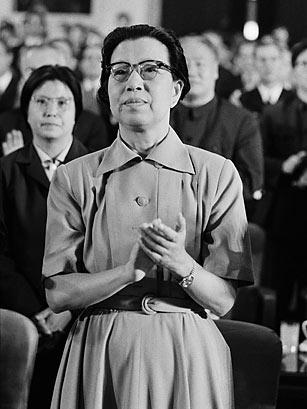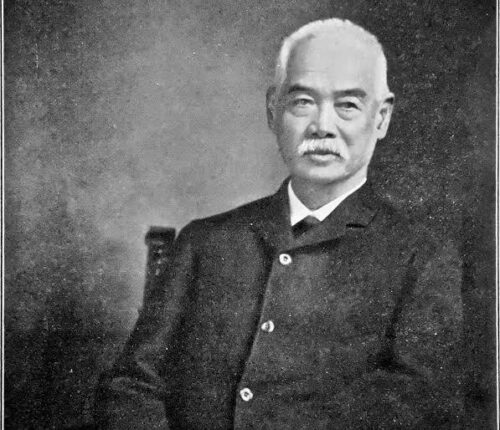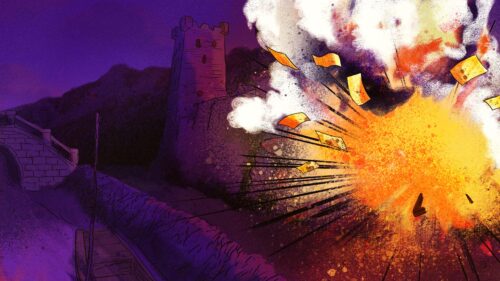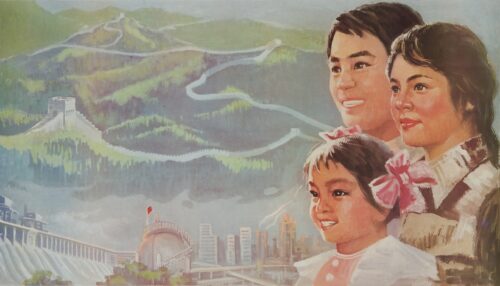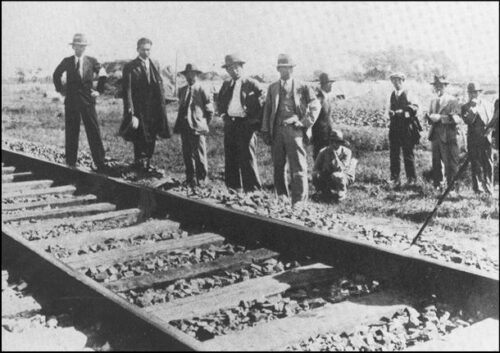This Week in China’s History: May 14, 1991
In the early morning hours of May 14, 1991, Jiāng Qīng 江青 — known to many as Madame Mao — took her own life. She had been imprisoned for a decade, serving a life sentence for vaguely defined “counterrevolutionary crimes,” before she hanged herself in a hospital washroom. Not reported widely for more than two weeks, her death was a coda to the Cultural Revolution that she had helped lead, a decade of tumult and violence in the service of Máo Zédōng’s 毛泽东 personality cult. Jiang Qing was responsible for the deaths of many thousands of people, and many times more careers and livelihoods, but she was not convicted of a specific crime. Rather, It was her marriage to Mao that led her to the heights of power and the forefront of the Cultural Revolution, and in the weeks after his death, the fall from that height was rapid and uncontrolled.
Mao’s Cultural Revolution abused and tormented China, but he would not be held responsible. Not really. In a feat of deflection and wordsmithing, the Party acknowledged that the Cultural Revolution was terrible, and also that it was Mao’s fault, but blamed the worst offenses on the Gang of Four: top-level Party officials who espoused the most radical version of the revolution and worked closely with Mao to implement his vision, often circumventing formal power structures to do so. Despite the catastrophes of the era — and before that, during the Great Leap Forward — the Party still considered Mao essential to its brand. With Mao dead and his reputation off-limits, the Gang of Four, and especially Jiang Qing, became a thinly veiled proxy as the Party strove to maintain power but distance itself from the last two decades of Mao’s legacy.
Born in Shandong province in 1914, raised with the name Lǐ Yúnhè 李雲鶴, Jiang Qing’s early life laid the foundation for the revolutionary politics that would define her adulthood. Her mother was the secondary wife of a carpenter; after an episode of domestic violence, her mother — whose name is not known — took her daughter and fled to Tianjin, and later Jinan, before attending university in Qingdao, the former German colony known for its beer.
After graduating university, Jiang Qing turned to politics and acting. She joined the Communist Party in 1933 and performed on stage and screen throughout the 1930s under the name Lán Píng 蓝苹, primarily in Shanghai and Beijing. With the fall of Shanghai to Japanese forces in 1937, she fled the city, eventually reaching the Communist base area in the desolate hills of Shaanxi around Yan’an. There, she became an instructor at the Lu Xun Academy of Arts. It was also around this time that she began using the name she would go by for the rest of her life, Jiang Qing.
More fatefully, Jiang Qing at this time also became involved with Mao Zedong. The relationship was scandalous. Not only was Mao married, but his (third) wife, Hè Zǐzhēn 贺子珍, was a veteran of the Long March and a skilled fighter for the revolution. (Mao and He had at least five children together.) At the time Jiang Qing arrived in Yan’an, He was in the Soviet Union, where she would remain until 1947.
Despite the fact that Mao was already married and nearly twice Jiang Qing’s age, the two wed in 1938. Supposedly, the marriage came with the stipulation that Jiang Qing stay out of politics for 20 — some sources say 30 — years.
When Mao was marginalized following the Great Leap Forward, Jiang Qing was one of his confidantes as he strategized to regain influence. Mao turned to “soft power” to rehabilitate himself and to regain his position of authority. His wife, who held important positions in the Central Propaganda Department and the Ministry of Culture, was crucial to his plans. In May 1966, Madame Mao became vice-chair of the Cultural Revolution Group, and remained one of the most powerful people in China for a decade. “I was Chairman Mao’s dog; whoever he said to bite, I bit,” Jiang Qing said later. Whether used at Mao’s direction or not, Jiang Qing’s teeth were sharp. More than anyone except Mao himself, Jiang Qing represented the violence and extremism of the Cultural Revolution.
Jiang Qing’s fall was sudden. After Mao died in September 1976, the so-called “October Coup” brought low the Gang of Four as part of the power struggle to succeed the People’s Republic’s founder. News of Jiang Qing’s arrest prompted celebrations on the streets of Shanghai. Her trial, along with the rest of the Gang of Four, was an essential part of Dèng Xiǎopíng’s 邓小平 rise and consolidation of power, sweeping out supporters of Mao’s Cultural Revolution and laying the foundation for the economic reforms that defined China’s reform and opening.
In November 1980, Jiang Qing was called to account in the epitome of a show trial, its outcome predetermined and its primary goal propaganda. Her indictment was some 20,000 pages long, detailing thousands of crimes, though rarely specifying Jiang Qing’s role in them. In a dialogue reported in Yang Jisheng’s The World Turned Upside Down, Jiang Qing responded to the judge’s warning that she ought to be afraid by shooting back, “Afraid of you? You’re afraid of me!” The exchange was just the prologue of a serial spectacle. Through the trial’s two months, Jiang Qing declared the chief judge a “fascist,” dared the court to chop off her head, and was repeatedly dragged from the courtroom, shouting revolutionary slogans.
The death sentence Jiang Qing received in late January came with a two-year reprieve, and then in 1983 the sentence was formally commuted to life imprisonment. That term ended on May 14, 1991, when Jiang Qing hanged herself in a hospital bathroom, where she had been released to on medical grounds.
Along with invective and defiance, Jiang Qing’s essential defense was that she was following Mao’s orders — she bit when he told her to. Ideological hair-splitting and evasion aside, the Gang of Four is, for most purposes, better understood as a Gang of Five, with Mao the silent partner who enabled the entire operation. It was an absurd notion that Jiang Qing deserved death but Mao adulation, but that was the Party’s position, and it worked hard to avoid reminders that Mao’s Cult of Personality, curated by the Party, was responsible for astonishing levels of misery and death. In the years after Mao’s death, titles like “Chairman” were done away with, term limits on Party Secretary enforced, and the number of people choosing new Party leaders gradually expanded, all in the name of diminishing the amount of power one person could wield.
But recently, the worm has turned.
In the spring of 2018, the National People’s Congress approved changes to the Constitution permitting Xi Jinping to remain president of the People’s Republic indefinitely (and presumably also continue in his more powerful role as General Secretary of the Communist Party). The move illustrated the concentration of power, from a small group of top leaders in the 1990s to just one man: Xi.
And that same spring, the Party permitted official remembrances of Jiang Qing. At the Qingming Festival, just days after the formal abolition of term limits, flowers and other offerings at Jiang Qing’s gravesite in Beijing were accepted and left in place. For decades, security at the gravesite had been tight. Elaborate displays were forbidden; tokens left at the grave were quickly removed. But no more.
The same dynamic continued in 2021: Radio Free Asia reported on the flowers and other offerings left at the grave, many of them brought by Maoist groups from across the country. (Many people brought attention to the contrast with the nearby grave of reformer Zhào Zǐyáng 赵紫阳, which remains off limits.)
Leaders who grow too powerful become a problem for their party. The personality of Mao Zedong was able to short-circuit government, law, and social norms for decades, wreaking havoc on his country and bringing the Party he had led to the edge of collapse. The generation of leaders after Mao seemed to have taken this lesson to heart, and emphasized the importance of structures, not individuals (Republicans in the United States might do well to consider Donald Trump’s willingness to reject democratic norms in order to claim political power).
The death of Jiang Qing seemed a major milestone in the elimination of Mao’s personality cult, but perhaps that lesson is being unlearned, or undone, by the rule of Xi Jinping?
This Week in China’s History is a weekly column.
